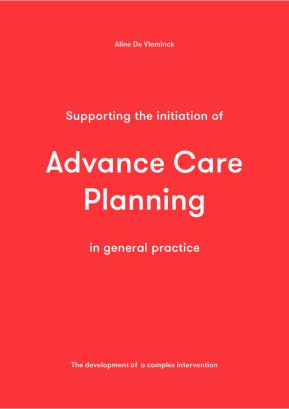Author: Aline De Vleminck
Date: 20-11-2015
Promotor: Prof. dr. Robert Vander Stichele and Prof. dr. Luc Deliens
Co-Promotor: Prof. dr. Koen Pardon
SUMMARY OF THE DISSERTATION
Background
Advance care planning (ACP) is a formalized process of communication between patients, relatives and professional caregivers. It has been defined as “a voluntary process of discussion and review enabling individuals to express, and, if they wish, record views, values and specific treatment choices to inform their future care”. ACP promotes the documentation of patients’ preferences in their medical file, the communication of these preferences to family and friends, and the periodic review of preferences when circumstances change. It has the potential to empower patients, to foster autonomy, to improve the quality of decision making for patients and relatives, and to increase the extent to which care is addressing patients’ needs and preferences. Given their longstanding, trusted relationship with patients, general practitioners (GPs) are likely to have good clinical and contextual knowledge of their patients and are able to evaluate whether their patients are ready to engage in ACP. However, the initiation of ACP in general practice remains limited. For this reason, this doctoral thesis has two main objectives: (1) to describe the experiences of the general population with regard to ACP and their information preferences when faced with life-limiting illness and (2) to develop an intervention to support the initiation of ACP in general practice.
Methods
In order to address the first objective, we used data from the national Health Interview Study that was collected in 2008 from a large representative sample of the Belgian population. The findings showed that few people in Belgium have discussed their wishes regarding medical treatment at the end of life with their physician or have completed an AD on euthanasia. Younger people, men, inhabitants of the Walloon region of Belgium, people with a poorer health status and people with fewer GP contacts represent a target group for education as they are less likely to engage in ACP. The majority of the Belgian population indicated the preference to always be informed concerning end-of-life care topics when faced with a life-limiting illness. Physicians should be aware of the desired level of information and tailor information to individual patient preferences.
To address the second objective, we performed a Phase 0-I study according to the UK Medical Research Council’s Framework for Complex Interventions. For this study, we used robust research methods: 1) a systematic review about the barriers and facilitators indicated by GPs to engage in ACP, 2) focus groups with GPs covering their experiences, attitudes and concerns regarding the initiation of ACP in general practice, 3) a literature search in order to obtain a comprehensive overview of key features that underpin successful ACP interventions and 4) a review of the preliminary complex intervention by an expert panel.
Results and conclusions
By using these methods, we gained insight into the barriers and facilitators for GPs to initiate ACP with their patients, the conceptualisations of GPs regarding ACP in terms of the content of ACP discussions and the tasks for GPs in the process of ACP, and the potential components of an intervention to support the initiation of ACP in general practice. Based on these findings, a preliminary intervention was developed consisting of: (1) a training for GPs in initiating and conducting ACP discussions, (2) a register of patients eligible for ACP discussions, (3) an educational booklet on ACP to enable patients to prepare for an ACP discussion, (4) a conversation guide to support GPs in the ACP discussions and (5) a structured template to record the outcomes of discussions. Future research is advised to focus on testing and finalizing the intervention in a subsequent feasibility and pilot study (Phase II).

